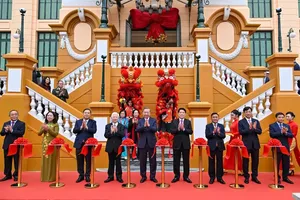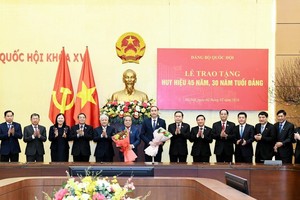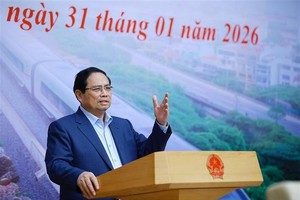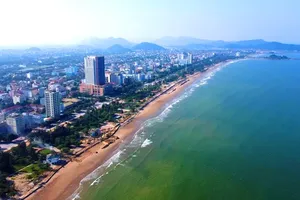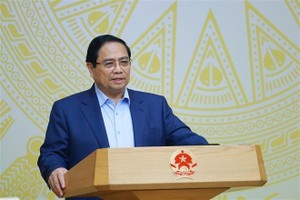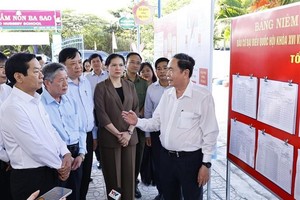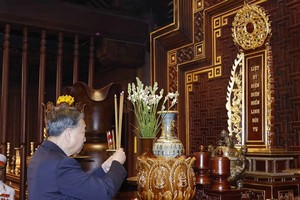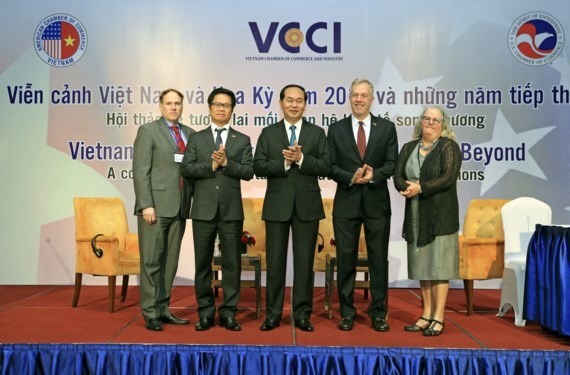
The conference, titled “The United States and Vietnam in 2017 and Beyond” and jointly hosted by the American Chamber of Commerce in Hanoi (AmCham) and the US Chamber of Commerce with cooperation from the Vietnam Chamber of Commerce and Industry (VCCI), aimed to promote expanded trade and investment through dialogues between government and industry leaders from both countries.
During his address, the President said that bilateral growth will be the basis for the comprehensive partnership between the two countries toward sustainability, stability, productivity and mutual benefits.
Sharing in the President’s belief, Ted Osius, current United States Ambassador to Vietnam, stressed that US firms have significant interest in the Vietnamese market, and he also trusts that trade, economic and investment ties between the two nations will be the foundation of mutual progress.
Quang suggested that businesses from both sides play more active roles in investment and trade according to Vietnam’s needs and the US’ advantages. He urged the United States to become the number one investor in sectors such as energy, oil, infrastructure, education and travel.
As an opportunity for business communities from both countries to engage in direct talks, solve remaining problems and share trade and investment experience, the conference featured discussions panels on healthcare, financial technology and market development, as well as innovations in information technology and manufacturing.
Participants also discussed the growth of small- and medium-sized enterprises, and they explored ways to improve market access through trade facilitation toward export-driven growth for Vietnam’s economy.
Vu Tien Loc, VCCI’s Chairman, asserted that even with the absence of the Trans Pacific Partnership (TPP), Vietnam and US bilateral trade ties will continue to strengthen through other cooperative mechanisms and new trade agreements to replace the TPP.
According to AmCham’s recent survey, Vietnam is still the number one choice for US companies, as more than 80 per cent of them hope to have higher revenue in 2017, 72 per cent believe the business environment in Vietnam is improving and 40 per cent plan to expand their business here in the next two years.
“American companies are excited about opportunities in Vietnam, however they face a number of challenges in the country through market access restrictions and other barriers, for which we are working to find concrete ways to strengthen the bilateral trading relationship, including the possibility of a bilateral free trade agreement,” said Tami Overby, Senior Vice President for Asia of the U.S. Chamber of Commerce.
In response, the government of Vietnam will work continuously to improve the domestic entrepreneurial environment, ensure fair competition and form a green and sustainable market economy through institutional reconstruction, human resource development and infrastructure unification.
Towards the end of yesterday’s conference, a Memorandum of Understanding, a Framework of Cooperation and a Letter of Collaborative Intent were signed by representatives from government agencies and trade organisations from both sides, namely the VCCI, the General Department of Vietnam Customs and AmCham.
US investors now play an important role in Vietnam’s economy, as the US ranks 8th amongst countries and territories with direct investment in the country, with a variety of multinational groups from the US turning a profit. However, President Quang expressed his hope that Vietnam will continue to export to the US a wide selection of agricultural products, seafood, textile, electronics and household goods.
Trade relations between the two nations are on the rise, having increased from 2008’s trade value of US$15 billion to 2016’s number of $52 billion. Furthermore, the US exports to Vietnam have risen by 43 per cent between 2015 and 2016, proving that bilateral economic ties are the fruits of joint announcements and oriented visions.
‘We are confident that the upward growth trend of trade and investment relations between the US and Vietnam will continue, and can strengthen,’ said AmCham Executive Director Adam Sitkoff.
